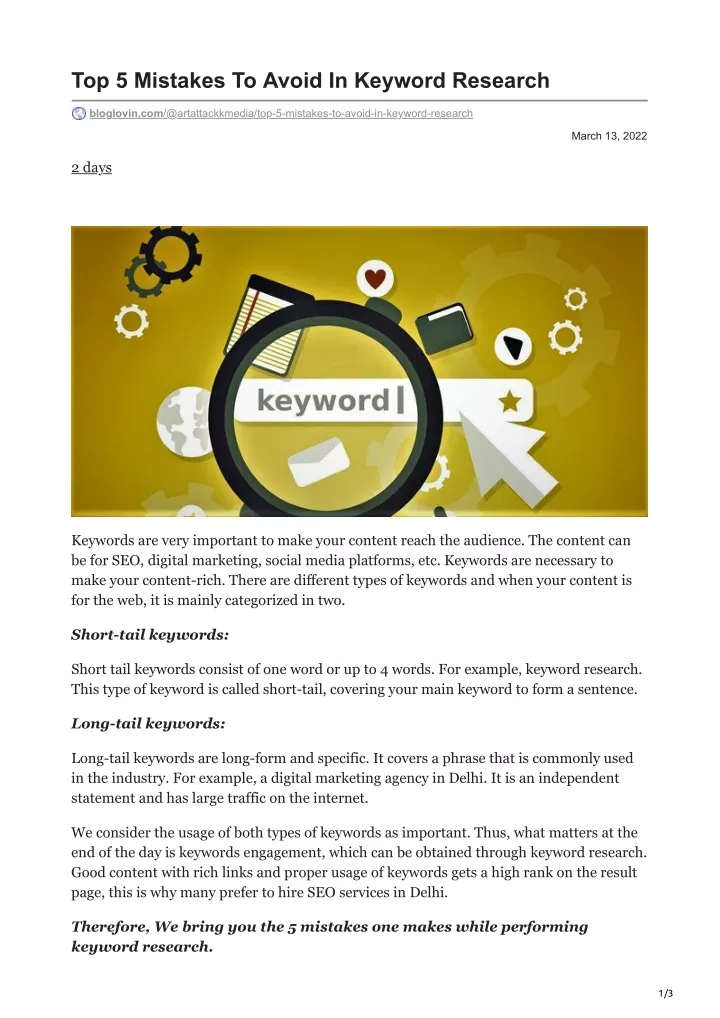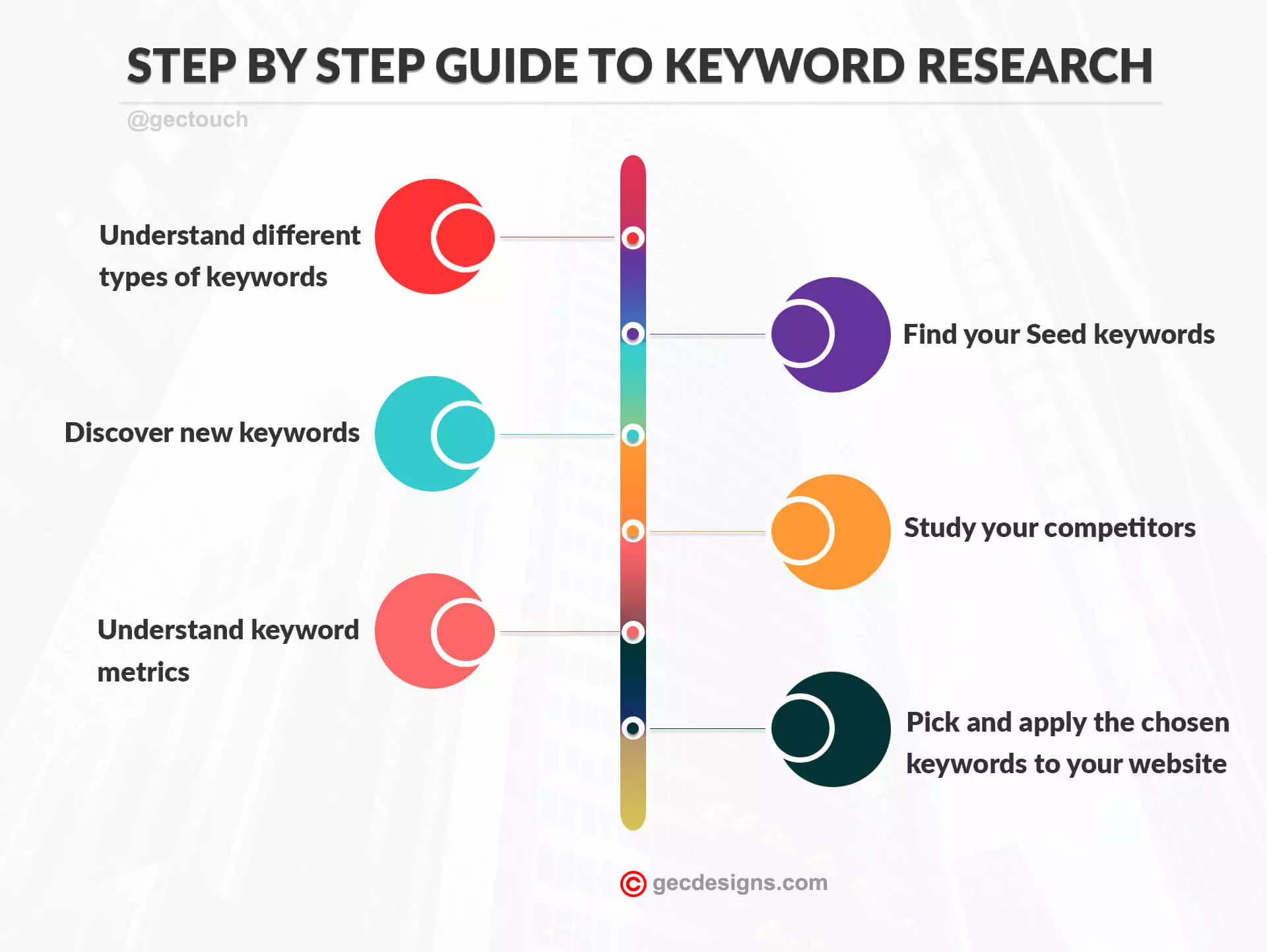Why Keyword Research is Crucial for Your Online Visibility
Keyword research is the backbone of any successful search engine optimization (SEO) strategy. It helps businesses understand their target audience, create relevant content, and ultimately drive more traffic and conversions to their website. By identifying the right keywords and phrases, businesses can optimize their website and content to rank higher in search engine results pages (SERPs), increasing their online visibility and reach.
In today’s digital landscape, keyword research is more important than ever. With millions of websites competing for attention online, businesses need to ensure that their website and content are optimized for the right keywords to stand out from the competition. By conducting thorough keyword research, businesses can gain a deeper understanding of their target audience’s needs, preferences, and behaviors, and create content that resonates with them.
Effective keyword research also helps businesses to identify gaps in the market and opportunities to create unique and valuable content. By analyzing keyword data, businesses can identify areas where their competitors are weak and create content that fills those gaps. This not only helps to improve their online visibility but also establishes their brand as a thought leader in their industry.
Furthermore, keyword research is essential for creating a successful content marketing strategy. By identifying the right keywords and phrases, businesses can create content that is optimized for search engines and resonates with their target audience. This can include blog posts, articles, social media posts, and other types of content that drive traffic and conversions to their website.
In conclusion, keyword research is a critical component of any SEO strategy. By identifying the right keywords and phrases, businesses can optimize their website and content, drive more traffic and conversions, and establish their brand as a thought leader in their industry. Whether you’re looking for the best keyword research tool for SEO or simply want to improve your online visibility, keyword research is an essential step in achieving your goals.
How to Choose the Best Keyword Research Tool for Your Needs
With so many keyword research tools available, choosing the best one for your needs can be overwhelming. To make an informed decision, it’s essential to consider several factors, including features, pricing, user interface, and customer support. In this section, we’ll discuss what to look for when selecting a keyword research tool, including the features that matter most for SEO success.
First and foremost, consider the features that are essential for your keyword research needs. Do you need a tool that provides keyword suggestions, competitor analysis, and SERP tracking? Or are you looking for a tool that offers more advanced features, such as keyword clustering and content optimization? Make a list of the features that are must-haves for your business, and then compare the tools that offer those features.
Next, consider the pricing of each tool. While it’s tempting to opt for the cheapest option, keep in mind that you often get what you pay for. Look for tools that offer a free trial or a money-back guarantee, so you can test the tool before committing to a purchase. Also, consider the cost per user, as some tools may charge more for additional users.
The user interface is also an essential factor to consider. Look for a tool that is easy to use and navigate, even for those who are new to keyword research. A user-friendly interface can save you time and frustration, and make it easier to get started with your keyword research.
Finally, consider the customer support offered by each tool. Look for tools that offer 24/7 support, as well as a comprehensive knowledge base and tutorials. This can be especially helpful if you’re new to keyword research or need help troubleshooting issues.
Some popular keyword research tools that offer a range of features and pricing options include Ahrefs, SEMrush, and Moz. These tools are often considered among the best keyword research tools for SEO, and offer a range of features that can help you optimize your website and content for better search engine rankings.
When choosing a keyword research tool, remember to consider your specific needs and goals. By selecting a tool that offers the features and pricing that are right for your business, you can maximize your ROI and achieve better SEO results.
Ahrefs vs SEMrush: A Comparison of Two Top Keyword Research Tools
Ahrefs and SEMrush are two of the most popular keyword research tools on the market, and for good reason. Both tools offer a range of features that can help businesses optimize their website and content for better search engine rankings. But which tool is right for your business? In this section, we’ll compare and contrast Ahrefs and SEMrush, discussing their features, pricing, and user interfaces.
Ahrefs is a comprehensive keyword research tool that offers a range of features, including keyword suggestions, competitor analysis, and SERP tracking. One of the standout features of Ahrefs is its keyword database, which contains over 1 billion keywords. This makes it an ideal tool for businesses that need to conduct in-depth keyword research. Ahrefs also offers a user-friendly interface that makes it easy to navigate and find the data you need.
SEMrush, on the other hand, is a more versatile tool that offers a range of features beyond keyword research. It includes tools for competitor analysis, technical SEO audits, and content optimization. SEMrush also offers a large keyword database, although it’s not as comprehensive as Ahrefs. However, SEMrush makes up for this with its user-friendly interface and affordable pricing.
When it comes to pricing, both Ahrefs and SEMrush offer a range of plans to suit different business needs. Ahrefs offers a basic plan for $99/month, while SEMrush offers a basic plan for $99.95/month. However, SEMrush also offers a free trial, which can be a great way to test the tool before committing to a purchase.
So which tool is right for your business? If you’re looking for a comprehensive keyword research tool with a large database, Ahrefs may be the better choice. However, if you’re looking for a more versatile tool that offers a range of features beyond keyword research, SEMrush may be the better choice. Ultimately, the decision will depend on your specific business needs and goals.
Both Ahrefs and SEMrush are considered among the best keyword research tools for SEO, and can help businesses optimize their website and content for better search engine rankings. By choosing the right tool for your business, you can maximize your ROI and achieve better SEO results.
Long-Tail Keywords: How to Use Them for Better SEO Results
Long-tail keywords are a crucial component of any successful SEO strategy. These keywords are more specific phrases that have lower search volumes, but are also less competitive and more targeted to a specific audience. By using long-tail keywords, businesses can increase their chances of ranking higher in search engine results pages (SERPs) and driving more relevant traffic to their website.
One of the main benefits of long-tail keywords is that they have lower competition. This means that businesses can rank higher in SERPs with less effort and resources. Additionally, long-tail keywords are more targeted to a specific audience, which means that businesses can attract more relevant traffic to their website.
So how can businesses use keyword research tools to find and optimize for long-tail keywords? The first step is to identify relevant topics and themes related to their business. This can be done by using keyword research tools such as Ahrefs or SEMrush to analyze competitors and identify gaps in the market.
Once relevant topics and themes have been identified, businesses can use keyword research tools to find long-tail keywords related to those topics. This can be done by using tools such as Google Keyword Planner or Ubersuggest to generate keyword ideas.
After identifying long-tail keywords, businesses can optimize their website and content to rank higher in SERPs. This can be done by incorporating long-tail keywords into page titles, meta descriptions, and headings. Businesses can also use long-tail keywords to create targeted content that attracts more relevant traffic to their website.
For example, a business that sells outdoor gear may use long-tail keywords such as “hiking backpacks for women” or “waterproof tents for camping”. By optimizing their website and content for these long-tail keywords, the business can attract more relevant traffic and increase their chances of ranking higher in SERPs.
By using long-tail keywords, businesses can create a more targeted and effective SEO strategy that drives more relevant traffic to their website. By incorporating long-tail keywords into their content and optimizing their website for search engines, businesses can increase their online visibility and drive more sales.
Keyword Research for Content Creation: Tips and Best Practices
Keyword research is a crucial step in the content creation process. By using keyword research tools, businesses can identify relevant topics and themes that resonate with their target audience. This information can then be used to create keyword-rich titles, meta descriptions, and headings that optimize content for search engines.
One of the most effective ways to use keyword research for content creation is to identify relevant topics and themes. This can be done by using keyword research tools such as Ahrefs or SEMrush to analyze competitors and identify gaps in the market. By identifying relevant topics and themes, businesses can create content that is more likely to resonate with their target audience.
Another important step in using keyword research for content creation is to create keyword-rich titles. This can be done by incorporating relevant keywords into the title of the content, as well as the meta description and headings. By doing so, businesses can optimize their content for search engines and increase their chances of ranking higher in search engine results pages (SERPs).
In addition to creating keyword-rich titles, businesses can also use keyword research to optimize their content for long-tail keywords. Long-tail keywords are more specific phrases that have lower search volumes, but are also less competitive and more targeted to a specific audience. By optimizing content for long-tail keywords, businesses can attract more relevant traffic to their website and increase their chances of converting visitors into customers.
Finally, businesses can use keyword research to track the performance of their content and adjust their strategy accordingly. By using tools such as Google Analytics or SEMrush, businesses can track the traffic and engagement metrics of their content and identify areas for improvement. This information can then be used to adjust the content strategy and optimize future content for better performance.
By using keyword research to inform content creation, businesses can create content that is more likely to resonate with their target audience and optimize for search engines. By incorporating relevant keywords into titles, meta descriptions, and headings, businesses can increase their chances of ranking higher in SERPs and driving more relevant traffic to their website.
Common Mistakes to Avoid in Keyword Research
Keyword research is a crucial step in the SEO process, but it can be easy to make mistakes that can negatively impact your online visibility. In this section, we’ll discuss some common mistakes to avoid in keyword research, including targeting overly competitive keywords, neglecting long-tail keywords, and failing to track keyword performance.
One of the most common mistakes in keyword research is targeting overly competitive keywords. These keywords are often highly sought after, but they can be difficult to rank for, especially for new or small businesses. Instead of targeting these keywords, it’s better to focus on long-tail keywords that are more specific and less competitive.
Another mistake to avoid is neglecting long-tail keywords. Long-tail keywords are more specific phrases that have lower search volumes, but they are also less competitive and more targeted to a specific audience. By neglecting long-tail keywords, businesses can miss out on opportunities to attract more relevant traffic to their website.
Failing to track keyword performance is another common mistake in keyword research. By not tracking keyword performance, businesses can’t see which keywords are driving traffic and conversions, and which ones need to be adjusted. This can lead to wasted time and resources on keywords that aren’t performing well.
Using the wrong keyword research tool is another mistake to avoid. With so many keyword research tools available, it can be easy to choose the wrong one. Look for a tool that offers features such as keyword suggestions, competitor analysis, and SERP tracking, and that is easy to use and navigate.
Not considering the user intent behind a keyword is another mistake to avoid. User intent refers to the reason why a user is searching for a particular keyword. By not considering user intent, businesses can create content that doesn’t meet the needs of their target audience, leading to low engagement and conversion rates.
Finally, not regularly updating and refining keyword research is another mistake to avoid. Keyword research is an ongoing process that requires regular updates and refinements. By not regularly updating and refining keyword research, businesses can miss out on new opportunities and trends in their industry.
Keyword Research Tools for Small Businesses and Entrepreneurs
As a small business or entrepreneur, it can be challenging to find keyword research tools that fit within your budget. However, there are several options available that can help you conduct keyword research without breaking the bank.
One of the most popular free keyword research tools is Google Keyword Planner. This tool provides a wealth of information on keyword search volume, competition, and suggested bid prices. It also offers features such as keyword suggestions, competitor analysis, and SERP tracking.
Another free keyword research tool is Ubersuggest. This tool provides keyword suggestions, competitor analysis, and SERP tracking, as well as a wealth of information on keyword search volume and competition.
SEMrush is another popular keyword research tool that offers a free trial, as well as a low-cost plan for small businesses and entrepreneurs. This tool provides a wealth of information on keyword search volume, competition, and suggested bid prices, as well as features such as keyword suggestions, competitor analysis, and SERP tracking.
Ahrefs is another popular keyword research tool that offers a low-cost plan for small businesses and entrepreneurs. This tool provides a wealth of information on keyword search volume, competition, and suggested bid prices, as well as features such as keyword suggestions, competitor analysis, and SERP tracking.
When choosing a keyword research tool, it’s essential to consider your specific needs and budget. Look for tools that offer features such as keyword suggestions, competitor analysis, and SERP tracking, and that are easy to use and navigate.
Additionally, consider the pricing and customer support offered by each tool. Look for tools that offer a free trial or a low-cost plan, as well as excellent customer support.
By using the right keyword research tool, small businesses and entrepreneurs can conduct keyword research that helps them understand their target audience and create relevant content. This can lead to improved search engine rankings, increased website traffic, and higher conversion rates.
Maximizing Your ROI with Keyword Research
Keyword research is a crucial step in the SEO process, but it’s not just about finding the right keywords. It’s also about maximizing your return on investment (ROI) with keyword research. By tracking keyword performance, adjusting your strategy, and measuring the impact of keyword research on your bottom line, you can ensure that your keyword research efforts are paying off.
One of the most important things to track when it comes to keyword research is keyword performance. This includes metrics such as search volume, competition, and conversion rates. By tracking these metrics, you can see which keywords are driving the most traffic and conversions to your website, and adjust your strategy accordingly.
Another key aspect of maximizing your ROI with keyword research is adjusting your strategy. This includes things like adjusting your keyword targeting, tweaking your content, and optimizing your meta tags. By making these adjustments, you can improve your search engine rankings and drive more traffic and conversions to your website.
Measuring the impact of keyword research on your bottom line is also crucial. This includes tracking metrics such as revenue, profit, and return on investment (ROI). By tracking these metrics, you can see the direct impact of your keyword research efforts on your business’s bottom line.
Using the right keyword research tool can also help you maximize your ROI. Look for tools that offer features such as keyword suggestions, competitor analysis, and SERP tracking. These features can help you find the right keywords, optimize your content, and track your performance.
Additionally, consider the pricing and customer support offered by each tool. Look for tools that offer a free trial or a low-cost plan, as well as excellent customer support.
By following these tips, you can maximize your ROI with keyword research and ensure that your keyword research efforts are paying off. Remember to track keyword performance, adjust your strategy, and measure the impact of keyword research on your bottom line.
By using the best keyword research tool for SEO, you can take your keyword research efforts to the next level and drive more traffic and conversions to your website. Whether you’re a small business or a large enterprise, keyword research is a crucial step in the SEO process that can help you achieve your online marketing goals.







